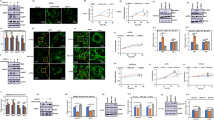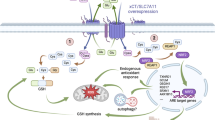Abstract.
Purpose: Downregulation of gap junctional intercellular communication (GJIC) has been implicated in carcinogenesis. This is a result of altered expression of connexins, the proteins that mediate GJIC, including connexin 43 (Cx43). Our aim was to evaluate the effect of known inducers of Cx43 on the chemosensitivity of the human neuroblastoma cell line IMR-32 to chemotherapeutic agents. Methods: We examined the effect of dibutyryl-cyclic AMP (db-cAMP) and all-trans-retinoic acid (tRA) on Cx43 and GJIC, glutathione (GSH) and γ-glutamyl-cysteine-synthetase (γ-GCS) levels, and glutathione S-transferase (GST) activity. Finally, we performed cell survival assays to measure the response of IMR-32 cells to the chemotherapeutic drugs doxorubicin, melphalan and bis-chloronitrosourea (BCNU), after treatment with db-cAMP and/or tRA. Results: Exposure to db-cAMP led to the upregulation of GJIC and Cx43 expression and phosphorylation. On the other hand, exposure to tRA led to the upregulation of GJIC but Cx43 expression and phosphorylation were not greatly affected. The combination of both agents was more potent in inducing GJIC in comparison to treatment with db-cAMP or tRA alone. Treatment with db-cAMP, but not with tRA, was associated with a significant increase in the cytotoxic effects of the anticancer drugs doxorubicin, melphalan and BCNU as shown by a decrease in their IC50 values. Concomitant exposure to db-cAMP and tRA, however, had a more pronounced effect on cell sensitization to chemotherapy drugs (particularly doxorubicin) than exposure to db-cAMP or tRA alone. Under the db-cAMP and tRA treatment conditions (which upregulate GJIC and modulate drug response), GSH levels were significantly reduced while the levels of GST and γ-GCS activities remained unchanged. Conclusions: This study suggests that GJIC plays a role in cellular drug resistance, and highlights the potential use of GJIC modulators in combination with chemotherapy. Also, this is the first study exploring the ability of both db-cAMP and tRA to enhance cell chemosensitivity.
Similar content being viewed by others
Author information
Authors and Affiliations
Additional information
Electronic Publication
Rights and permissions
About this article
Cite this article
Carystinos, G.D., Alaoui-Jamali, M.A., Phipps, J. et al. Upregulation of gap junctional intercellular communication and connexin 43 expression by cyclic-AMP and all-trans-retinoic acid is associated with glutathione depletion and chemosensitivity in neuroblastoma cells. Cancer Chemother Pharmacol 47, 126–132 (2001). https://doi.org/10.1007/s002800000231
Received:
Accepted:
Issue Date:
DOI: https://doi.org/10.1007/s002800000231




